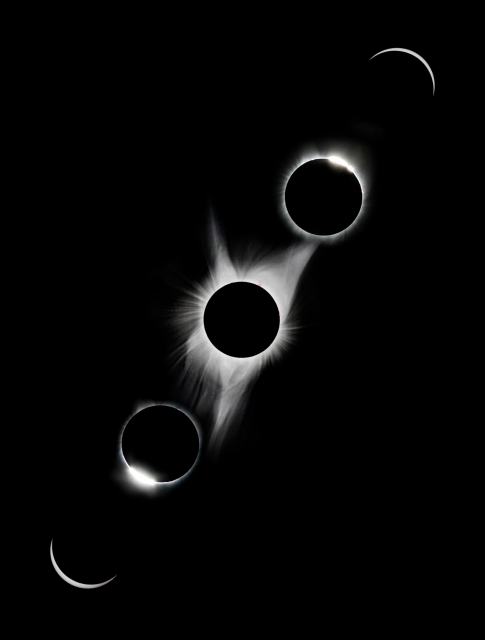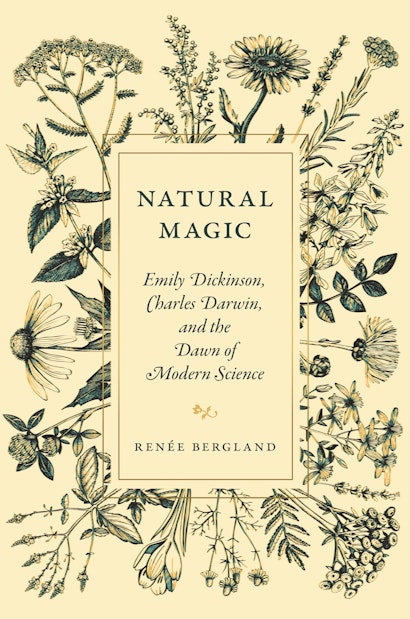As the warmest winter in human history draws to a close, many of us are unsure about what comes next. Familiar patterns have changed. Here in New England, the seasons are becoming wildly unpredictable. At least celestial mechanics are unaffected. The Earth, the Moon, and the Sun continue to move like clockwork. We knew exactly when and where they would line up for the next solar eclipse. On April 8, the path of totality arced northward across the United States from Texas to Vermont, New Hampshire, and Maine.
Twenty years ago, New Englanders who wanted to witness an April eclipse would have booked tickets for Texas or Arkansas. This year, it was hard to predict. After months of back-and-forth, my little coterie of scientists, journalists, and historians decided to observe the event in northern Vermont. Though we knew that significant cloud cover would have been highly probable in the past, we concluded that historical weather patterns are not all that predictive anymore.
Eclipses have a complicated relationship to foretelling the future. Long ago, astronomical and meteorological phenomena were seen as supernatural messages. Like shooting stars, auroras, and comets, eclipses were often considered portents of social upheaval and danger. Eclipses tended to come unexpectedly, out of the blue. They filled people with terror. Yet, it has been many centuries since eclipses were truly unpredictable. Cunieform inscriptions on ancient clay tablets show that Babylonian astronomers knew how to calculate future eclipses twenty-five centuries ago. They shared their predictions with the king but kept them secret from the people.
If the information was kept under wraps, astronomical insiders who knew that an eclipse was coming could use their knowledge to manipulate the uninformed. The best-known example of such trickery happened in 1504, when Christopher Columbus used his almanac’s prediction of an eclipse to frighten indigenous Jamaicans into submission.
In 1832, the natural philosopher David Brewster condemned such abuses of scientific knowledge. In the past, he said, “the prince, the priest, and the sage were leagued in a dark conspiracy” to use their secret knowledge for “the subjugation of the great mass of society.” In a treatise that debunked Natural Magic, Brewster argued that keeping knowledge “occult” prevented people from working together to advance science. In his view, interpreting a meteorological event as a sign or a message was superstition, not science.
Mark Twain’s A Connecticut Yankee in King Arthur’s Court told the story of a time-traveling trickster who predicted an eclipse to manipulate the credulous denizens of the Dark Ages. By 1889, when Twain published his comic novel, it was easy to ridicule the idea that a solar eclipse might be seen as a meaningful portent. Prevailing, mechanistic views of the cosmos seemed to imply that everything was meaningless.
In the early twentieth century, the German sociologist Max Weber described the turn away from ascribing meaning to natural phenomena as “the disenchantment of the world.” However, some nineteenth-century figures refused to embrace disenchantment.
Charles Darwin was among those who hesitated. The critic George Levine describes him as a “secular enchanter” who was as skeptical of dogmatic disenchanters as he was of all the other dogmatists. It was impossible for Darwin to separate biology, geology, and astronomy from each other, and he thought life on Earth was connected to the cosmos beyond our planet in mysterious and awe-inspiring ways. On the Origin of Species concluded by declaring the “grandeur in this view of life… that, whilst this planet has gone cycling on according to the fixed law of gravity, from so simple a beginning, endless forms most beautiful and most wonderful have been, and are being, evolved.”
Emily Dickinson was influenced by Darwin. Like him, she believed everything was mysteriously connected and that the natural world was rich with meaning. For her, eclipses symbolized the existence of the unseen. As she put it, “Eclipses—Suns—imply.”
Of course, any other implications of eclipses were mysterious. In another poem, Dickinson wrote about waiting for an eclipse (“Midnight’s—due—at Noon—”), and remarked,
Eclipses be—predicted—
And Science bows them in—
But do One face us suddenly—
Jehovah’s Watch—is wrong—
Dickinson’s verse captures the mood of my eclipse group perfectly. From astronomy, we knew the eclipse was coming and that the path of totality would swing above northern New England on April 8. From meteorology, we knew that the eclipse was very likely to be obscured by clouds. Based on historical patterns, there was less than a 20% chance that we would be able to see the eclipse from Vermont. And yet, we gathered our eclipse glasses and made our reservations for the Northeast Kingdom. We thought the sky was likely to be clear because our climate had already changed, and this April would be shockingly different from Aprils past.
Our guess was right. The skies were clear over northern Vermont. The day was bright , sunny, and unseasonably warm. We beat the traffic and set up our camp chairs at 10:00 AM, more than five hours before totality. Although we had planned pretty well, we had not brought quite enough water, and we had completely forgotten sunscreen. We had expected—theoretically—that the afternoon on the shores of Lake Memphremagog might be sunny, but we were still surprised to find ourselves enjoying a day at the beach with thousands of other astronomy fans.
As the moon moved in front of the sun, the air grew colder. We shrugged on jackets and dug out hats and gloves. In the heart of the shadow, the light was deep, dark blue. Overhead, we could see the dark side of the moon encircled by pale silver radiance. Venus was bright. In every direction, the horizon flushed with pink and gold. A loudspeaker counted down the seconds until a blinding flash of direct sunlight forced us to cover our eyes as totality ended.
I was thrilled and terrified to witness that improbable Vermont eclipse. It is rare to experience the vertiginous thrill of planetary motion. It is extraordinary to witness the swift, smooth turning of the solar system. Yet although it was a glorious spectacle, seeing the eclipse on that clear April afternoon in Vermont made me as uneasy as an ancient Babylonian. It should have been cloudy and cold, not clear and bright. The moon and the sun might have followed the ancient laws, but Earth’s atmosphere did not. The weather is different this year.
We should not ignore the implication of all that sunshine. Far above the earth, the moon and sun kept to their schedule. Down here, human activity has changed the season’s clockwork. If this was a portent, we should pay attention to the message: “Jehovah’s Watch—is wrong—.”
Renée Bergland is the author of Natural Magic: Emily Dickinson, Charles Darwin, and the Dawn of Modern Science and a professor at Simmons University.

